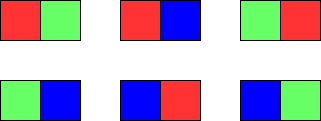LeetCode in Kotlin
1931. Painting a Grid With Three Different Colors
Hard
You are given two integers m and n. Consider an m x n grid where each cell is initially white. You can paint each cell red, green, or blue. All cells must be painted.
Return the number of ways to color the grid with no two adjacent cells having the same color. Since the answer can be very large, return it modulo 109 + 7.
Example 1:

Input: m = 1, n = 1
Output: 3
Explanation: The three possible colorings are shown in the image above.
Example 2:

Input: m = 1, n = 2
Output: 6
Explanation: The six possible colorings are shown in the image above.
Example 3:
Input: m = 5, n = 5
Output: 580986
Constraints:
1 <= m <= 51 <= n <= 1000
Solution
@Suppress("NAME_SHADOWING")
class Solution {
fun colorTheGrid(m: Int, n: Int): Int {
if (m == 1) {
return (3L * powMod(2, n - 1) % P).toInt()
}
if (m == 2) {
return (6L * powMod(3, n - 1) % P).toInt()
}
if (n == 1) {
return (3L * powMod(2, m - 1) % P).toInt()
}
if (n == 2) {
return (6L * powMod(3, m - 1) % P).toInt()
}
val totalTemplates = 1 shl m - 2
val totalPaintings = binPow(3, m)
val paintingToTemplate = IntArray(totalPaintings)
val paintingCountForTemplate = LongArray(totalTemplates)
val templateEdgeCount = Array(totalTemplates) { LongArray(totalTemplates) }
val templateToIndex: MutableMap<Int, Int> = HashMap(1 shl m - 2)
val templateCounter = 0
extracted(
m,
totalPaintings,
paintingToTemplate,
paintingCountForTemplate,
templateToIndex,
templateCounter,
)
extracted(m, totalPaintings, paintingToTemplate, templateEdgeCount)
for (i in 0 until totalTemplates) {
val c = paintingCountForTemplate[i]
for (j in 0 until totalTemplates) {
templateEdgeCount[i][j] /= c
}
}
val matrixPower = matrixPower(templateEdgeCount, n.toLong() - 1)
var ans: Long = 0
for (i in 0 until totalTemplates) {
var s: Long = 0
val arr = matrixPower[i]
for (a in arr) {
s += a
}
ans += paintingCountForTemplate[i] * s
}
return (ans % P).toInt()
}
private fun extracted(
m: Int,
totalPaintings: Int,
paintingToTemplate: IntArray,
templateEdgeCount: Array<LongArray>,
) {
for (i in 0 until totalPaintings) {
if (paintingToTemplate[i] == -1) {
continue
}
for (j in i + 1 until totalPaintings) {
if (paintingToTemplate[j] == -1) {
continue
}
if (checkAllowance(i, j, m)) {
templateEdgeCount[paintingToTemplate[i]][paintingToTemplate[j]]++
templateEdgeCount[paintingToTemplate[j]][paintingToTemplate[i]]++
}
}
}
}
private fun extracted(
m: Int,
totalPaintings: Int,
paintingToTemplate: IntArray,
paintingCountForTemplate: LongArray,
templateToIndex: MutableMap<Int, Int>,
templateCounter: Int,
) {
var templateCounter = templateCounter
for (i in 0 until totalPaintings) {
val type = getType(i, m)
if (type == -1) {
paintingToTemplate[i] = -1
continue
}
var templateIndex = templateToIndex[type]
if (templateIndex == null) {
templateToIndex[type] = templateCounter
templateIndex = templateCounter++
}
paintingToTemplate[i] = templateIndex
paintingCountForTemplate[templateIndex]++
}
}
private fun checkAllowance(a: Int, b: Int, m: Int): Boolean {
var a = a
var b = b
for (i in 0 until m) {
if (a % 3 == b % 3) {
return false
}
a /= 3
b /= 3
}
return true
}
private fun getType(a: Int, m: Int): Int {
var a = a
var m = m
val digits = IntArray(3)
val first = a % 3
val second = a % 9 / 3
if (first == second) {
return -1
}
digits[second] = 1
digits[3 - first - second] = 2
var prev = second
var type = 1
m -= 2
a /= 9
while (m-- > 0) {
val curr = a % 3
if (prev == curr) {
return -1
}
type = type * 3 + digits[curr]
prev = curr
a /= 3
}
return type
}
private fun powMod(a: Int, b: Int): Int {
var a = a
var b = b
var res: Long = 1
while (b != 0) {
if (b and 1 != 0) {
res = res * a % P
--b
} else {
a = (a.toLong() * a % P).toInt()
b = b shr 1
}
}
return res.toInt()
}
private fun binPow(a: Int, n: Int): Int {
var n = n
var res = 1
var tmp = a
while (n != 0) {
if (n and 1 != 0) {
res *= tmp
}
tmp *= tmp
n = n shr 1
}
return res
}
private fun matrixPower(base: Array<LongArray>, pow: Long): Array<LongArray> {
var base = base
var pow = pow
val n = base.size
var res = Array(n) { LongArray(n) }
for (i in 0 until n) {
res[i][i] = 1
}
while (pow != 0L) {
if (pow and 1L != 0L) {
res = multiplyMatrix(res, base)
--pow
} else {
base = multiplyMatrix(base, base)
pow = pow shr 1
}
}
return res
}
private fun multiplyMatrix(a: Array<LongArray>, b: Array<LongArray>): Array<LongArray> {
val n = a.size
val ans = Array(n) { LongArray(n) }
for (i in 0 until n) {
for (j in 0 until n) {
for (k in 0 until n) {
ans[i][j] += a[i][k] * b[k][j]
}
ans[i][j] %= P.toLong()
}
}
return ans
}
companion object {
const val P = 1000000007
}
}

